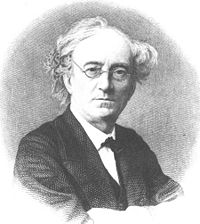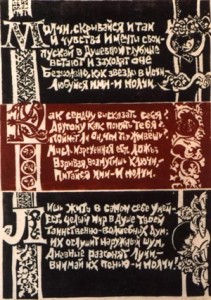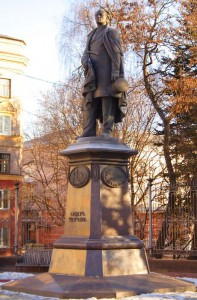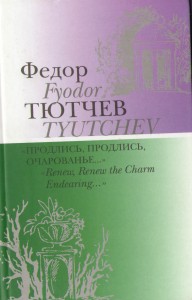 To talk about poetry first sit and relax listening to the wonderful music:“Beautiful Russian relaxing song”
To talk about poetry first sit and relax listening to the wonderful music:“Beautiful Russian relaxing song”
Take a look at a small book of verses by Fyodor Tyutchev “Renew, renew the Charm Endearing”, M. Vagrius, 2008, and recite yourself or listen to somebody’s reciting for you:“Stalker’s wife and child’s reciting Tyutchev’s poem”Your eyes”
С игрой их пламенно-чудесной,
Когда их приподымешь вдруг
И, словно молнией небесной,
Окинешь бегло целый круг…
Но есть сильней очарованья:
Глаза, потупленные ниц
В минуты страстного лобзанья,
И сквозь опущенных ресниц
Угрюмый, тусклый огнь желанья.”
1836
 It is sounded and written in Russian because Fyodor Tyutchev was born into a family of well-to-do landowners of the manor Ovstug of Orel province, now Bryansk region, Russia. After graduating from Moscow University at the age of 18, he joined the Foreign Service and for next 22 years lived abroad, serving for most of the time
It is sounded and written in Russian because Fyodor Tyutchev was born into a family of well-to-do landowners of the manor Ovstug of Orel province, now Bryansk region, Russia. After graduating from Moscow University at the age of 18, he joined the Foreign Service and for next 22 years lived abroad, serving for most of the time as a diplomat at the Russian Embassy in Munich. Here he immersed himself in Western culture, becoming personally acquainted with such figures as Heinrich Heine and Friedrich Schelling and in general absorbing the influences of German Romantic literature and philosophy. He lived most interesting and exciting life. His first cycle of poems was published in 1836 in “Contemporary” journal by Pushkin who praised Tyutchev as a poet for his primary poetic talent.
as a diplomat at the Russian Embassy in Munich. Here he immersed himself in Western culture, becoming personally acquainted with such figures as Heinrich Heine and Friedrich Schelling and in general absorbing the influences of German Romantic literature and philosophy. He lived most interesting and exciting life. His first cycle of poems was published in 1836 in “Contemporary” journal by Pushkin who praised Tyutchev as a poet for his primary poetic talent.
And he really was. Never mind his inspirations’ roots: women, nature or life itself.
He died on July 15, 1873 in Tsarskoe Selo, in the place where Pushkin reigned, his poetry, his love.
“Poetry” by Tyutchev:
“Amidst the thunder, tempest, fire,
Amidst their boiling, swirling ire, 
In flaming strife and disarray,
From heaven to the earth she flies
With azure brightness in her eyes
To live among the sons of clay,-
And on the wild tumultuous sea
She pours the oil of harmony.
Translated by Eugene M. Kayden”
Principle of faith was always remained alive for Tyutchev: “Above the dark crowd of not awaken people goest thou when, freedom, flashes a ray of your God?…” The poet is sure that the sanctuary of God on earth was the suffering people. But true as Grossman said that Tyutchev’s “religious way is the recognition of democracy”.
The last poem is dedicated to his wife E.F. Tyutcheva:
“The Lord took everything away from me:
My will, my health, my rest, my breath of air,
You only has He left to care for me
That I could pray to Him in my despair”.
Translated by Eugene M. Kayden
Such a life! And the last. John Dewey in his book “Mirror of the Soul: A Life of the Poet Fyodor Tyutchev”, with new translations of the verse, states that Tyutchev was attracted to the ideal rather than the reality of his native land. For him Russia remained a metaphysical concept of perfection, demanding blind, unthinking belief in the face of all evidence to the contrary. That is the message of a brief epigram written towards the end of his life which both in Russia and beyond has acquired the distinction of becoming the mostly frequently quoted ( and often parodied) utterance:
“One cannot understand Russia by reason,
Cannot measure her by a common measure:
She is under a special dispersation – ONE
Can only believe in Russia.”
Translated by Nabokov, Vladimir (1944) Three Russian Poets, Selection from Pushkin, Lermontov and Tyutchev in New Translations by Vladimir Nabokov, Norfolk, CT. New Directions.
Reading “Silentium” by Tyutchev in translation by Vladimir Nabokov
